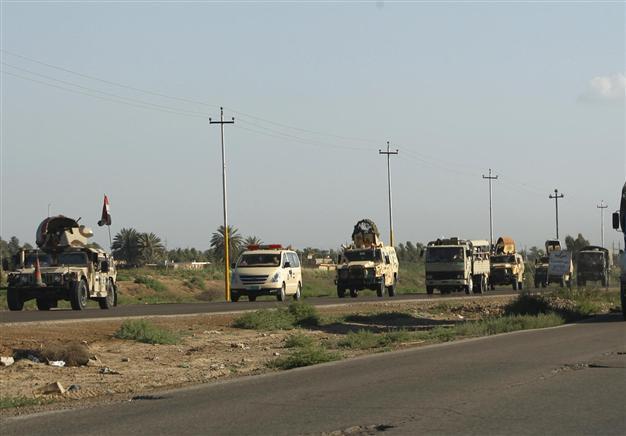Iraq PM warns of sectarian war as 169 killed
BAGHDAD - Agence France-Presse

Iraqi troops travel in military vehicles towards Hawija, near Kirkuk, 170 km north of the capital Baghdad, April 23, 2013. REUTERS Photo
Iraqi Prime Minister Nuri al-Maliki warned today of a return to "sectarian civil war," with 169 people killed in three days of violence and troops surrounding a town held by gunmen.
Maliki urged ordinary Iraqis "to take the initiative, and not be silent about those who want to take the country back to sectarian civil war," in remarks broadcast on state television.
The violence began on Tuesday when security forces moved in against anti-government protesters near the Sunni Muslim town of Hawijah in northern Iraq, sparking clashes that left 53 people dead.
A wave of subsequent unrest, much but not all of it apparently revenge attacks for the Hawijah clashes, killed dozens more people, and brought the toll by Thursday to 169 dead and 280 wounded.
The protest-related violence is the deadliest so far linked to demonstrations that erupted in Sunni areas of the Shiite-majority country more than four months ago.
The protesters have called for the resignation of Maliki, a Shiite, and railed against authorities for allegedly targeting their community, including with what they say are wrongful detentions and anti-terrorism charges.
On Thursday, attacks in Fallujah, west of Baghdad, killed two Sahwa anti-Qaeda militiamen, two federal policemen, and wounded two more, a police captain and a doctor said.
And a roadside bomb against an army patrol in Jurf al-Sakhr, south of Baghdad, killed two soldiers, according to a police officer and a doctor.
The toll from heavy fighting on Wednesday in the northern city of Mosul also rose, with officers and a doctor saying a further 31 gunmen and four police were killed, bringing the total to 40.
Meanwhile, the army deployed reinforcements around Sulaiman Bek, and was preparing to retake the Salaheddin provincial town, a day after it was seized by a group of unidentified gunmen, officials said.
The gunmen swarmed into the predominantly Turkmen Sunni town after deadly fighting with the security forces, who pulled back in the face of the offensive as residents fled.
"We withdrew tactically so we can work on clearing the area completely, after we knew that the residents had left," a high-ranking army officer told AFP.
"We will clean the region corner by corner, and we will not allow any attack against the safety of citizens," the officer said.
Local official Shalal Abdul Baban said gunmen were still in complete control of the town but that the army was deploying reinforcements on its outskirts.
The military said the operation in Hawijah that sparked the clashes was aimed at the Naqshbandiya Army, a band of Sunni militants it said had infiltrated the ranks of the anti-government protesters.
Two leaders of the Hawijah protest said on Thursday they would form a wing of the Naqshbandiya Army in response to Tuesday's killings.
"We in the Uprising of the Free People of Iraq announced our full loyalty to the (Naqshbandiya Army), so we can be an armed wing related to it, working on cleaning Iraq from Safavid militias," protest spokesman Hamed al-Juburi said.
Safavid is a pejorative word for Shiites, who make up the majority of Iraqis.
"We will take revenge for the massacre of Hawijah," he said.
"After they burned our tents and broke into our sit-in, we decided to join the (Naqshbandiya Army) as a military wing," protest organiser Abdulmalik al-Juburi said.
